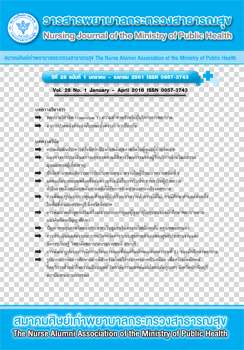A Participatory Management Education Model through Simulated Family System to Develop Humanized Health Care Identity
Main Article Content
Abstract
The purposes of this study were to develop a participatory management education model through a simulated family system to develop humanized health care identity, and to examine an effectiveness of the model at Abhaibhubejhr College of Thai Traditional Medicine Prachinburi, Praboromarajchanok Institute for Health Workforce Development.
A purposive sampling technique was used to recruit 115 participants consisting of instructors and students of Abhaibhubejhr College of Thai Traditional Medicine Prachinburi and people from the community nearby. The study was divided into 5 phases, comprising 10 steps. Data were collected from year 2014 to 2016 using interview questionnaire, assessment form and lesson learned recording forms.
The results showed that the participatory management education model consisted of principles, objectives, processes, evaluation and supporting factors. The model comprised 3 steps including 1) creating vision, 2) developing participation, and 3) managing education. In addition, it was also found that after the model was applied, students had higher levels of humanized health care
and innovation skills than those of before.
Article Details
บทความและรายงานวิจัยในวารสารพยาบาลกระทรวงสาธารณสุข เป็นความคิดเห็นของ ผู้เขียน มิใช่ของคณะผู้จัดทำ และมิใช่ความรับผิดชอบของสมาคมศิษย์เก่าพยาบาลกระทรวงสาธารณสุข ซึ่งสามารถนำไปอ้างอิงได้
References
2. Siriporn L, Jutarosaga M, Charoensuk S, Nopaphanlop F, Santwanpas N. Integrated education model of systems thinking and humanized health care within multi–cultural society, Praboromarajchanok Institute. Journal of Nursing and Education 2014 ; 7(1):39–54.
3. Jutarosaga M. Learning process to create service mind and humanized care by using simulated family system. Khonkaen. Klang nan a wittaya press. 2nd edition. 2010.
4. Burapa university, applied Thai traditional medicine curriculum, revised version, 2011.
5. Ministry of Education. National Education Act B.E. 2542 [Internet]. [cited 2018 March 20]. Available from: http://www.moe.go.th.
6. Jutarosaga M, Jutarosaga A. Creating the Innovation in Healthcare and Public Health. Bangkok; 2015.
7. DeMonte J.High-quality professional development for teachers : supporting teacher training to improve student learning. Washington D.C. Center for American Progress. 2015.
8. Jutarosaga M, Jutarosaga A. Reflection, creatively systematic thinking process using the three baskets concept. Bangkok; 2016.
9. Hanpattanachaikul S, Jutarosaga M, Siliporn L, et al. The development of well–being under the innovation of simulated family system (one college one community). Nursing Journal of the Ministry of Public Health 2014; 24 (1): 67–79.
10. Health Assembly. Education reform for health personal, in accordance with health necessity in Thai context. Bangkok; 2012.

